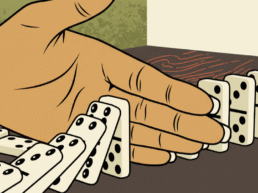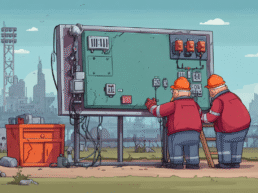If you disappeared from your business for a few weeks, with no notice and no laptop, what would break first? It’s not a fun question to ask, but it’s one I put to founders often, because the answer often reveals something far more important than a missing process. It shows where the business still depends entirely on them.
I know, because I asked myself the same question a few years ago. I was tired of never being able to take a proper break – the kind where you switch off completely and focus on family, not just check your emails from a different location. I had this picture in my head of pottering around Europe, squeezed into our camper van with the family for a month or more. I set a simple, clear goal: the business should be able to run without me for one full calendar month.
Why ask the uncomfortable question?
It turned out to be one of the wisest things I ever did, though not for the reason I expected. I didn’t end up heading off in the Wafflebus (all campers have names; sorry, I’m not explaining ours). Instead, I found myself in hospital for a series of prolonged spells following a cancer diagnosis. Suddenly that freedom project became a survival plan.
The systems we’d built to give me time off ended up keeping the business alive. The team kept things moving, clients were looked after, everyone stayed employed, and when I finally came home, both the business and I were still standing.
If that diagnosis had come twelve months earlier, I suspect I would have lost the business. Possibly also the family home.
Resilience isn’t just for crises
That experience completely changed how I think about resilience. It’s easy to treat it as something for extreme situations – a word you associate with insurance policies and server backups. But it’s also about everyday freedom. The same steps that protect a business in a crisis are the ones that let a founder take a proper holiday, make your days your own and just stop you being the bottleneck for everything. If you are eyeing an exit one day, they’re also the same steps that make an agency more valuable and more saleable. It’s not about preparing for the worst. It’s about building a business that runs better when you’re not holding it together.
Tackling every founder dependency can feel like a big, abstract project, but the “What breaks first?” question is a simple way to cut through the noise and find the most critical points – the ones worth fixing first.
The “first point of critical failure” is often around finances. I speak to a lot of agencies where only the founder can make supplier payments or approve payroll, and things can grind to a halt surprisingly quickly when the money stops moving. But the real value of the question is in looking at your own business – identifying what would break first for you, and then putting something in place to stop it happening.
The “Oh shit document”
A great starting point is what I like to call the “Oh Shit Document”. It’s a single file that one or two trusted people know about and can access if needed. I hold versions of this for a few business owners I work with. The contents vary, but usually include key contacts, logins, infrastructure notes and a short emergency plan for covering an unexpected month-long absence. It’s a quick, simple job that instantly adds a layer of resilience to any business.
When my own absence came, it wasn’t the systems or the spreadsheets that kept the business running, it was the people I worked with. My team held everything together, made good decisions and looked after each other and our clients. I’ll always be grateful for that. The process we went through to reduce dependency on me just removed the barriers to them doing that.
In the end, that’s what resilience really looks like. It’s not just having the right documents or processes in place; it’s building a business that can cope, adapt, and carry on without you for a while. That’s the kind of freedom worth working towards, whether you’re planning a month on the road or just a week where you can finally switch off.
Discuss this on LinkedInEnjoy what you read??
If you found this content useful, why not sign up for updates? I don’t post often, but I do try to make what I post useful and/or interesting. No ChatGPT auto-gen guff here! Add your details below for a short email whenever I add something new. You can of course unsubscribe again at any time.



